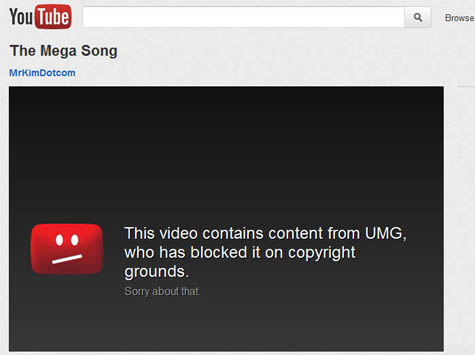 Last Friday, file-hosting service Megaupload surprised the Internet by launching a campaign fronted by a Printz Board-produced song featuring some of the world’s most prominent recording artists.
Last Friday, file-hosting service Megaupload surprised the Internet by launching a campaign fronted by a Printz Board-produced song featuring some of the world’s most prominent recording artists.
Needless to say, the spectacle of P Diddy, Will.i.am, Alicia Keys, Kanye West, Snoop Dogg, Macy Gray, Chris Brown, The Game and Mary J Blige all declaring their love for Megaupload was too much for the IFPI and RIAA.
As the story began to spread and the Mega Song trended on Twitter, it was suddenly blocked by YouTube, a victim of Universal Music Group (UMG) and IFPI copyright takedowns.

What followed late Friday were demands from Mega founder Kim Dotcom for YouTube to reinstate the video (full details in our earlier article), and counters from Universal to take it down again. With the weekend over, the controversy is alive again.
“Let us be clear: Nothing in our song or the video belongs to Universal Music Group. We have signed agreements with all artists endorsing Megaupload,” Megaupload CEO David Robb told TorrentFreak this morning.
“Efforts to reach out to UMG and open a dialog about this abuse of the DMCA process were answered with unfounded and baseless legal threats and demands for an apology.”
Threats against Megaupload from the mainstream entertainment industries are nothing new, yet thus far the movie and music groups have refrained from legal action. Nevertheless, the name-calling persists.
“Regrettably, we are being attacked and labeled as a ‘rogue operator’ by organizations like the RIAA and the MPAA, which represent some of the music and movie industry. They are wrong,” says Robb.
“Our record of closing accounts of repeat infringers and taking down illegal files proves we stand against piracy and care about the rights of content owners.”
But while Mega insists it always complies with legitimate takedown requests as required by law, the RIAA and their member labels want much more, as their championing of the Stop Online Piracy Act illustrates.
“UMG is currently lobbying lawmakers in Washington for legislation that would allow them to not only delete specific content from a website, but to delete entire websites from the Internet. After this demonstration of the abuse of power by UMG, we are certain that such an instrument of Internet censorship should not be put into the hands of corporations,” says Robb.
Those corporations, Robb suggests, may have already abused their existing powers to censor the Mega Song campaign on YouTube for commercial ends. Mega will shortly relaunch Megabox, a label-worrying iTunes competitor that will give artists 90% of all sales, a far bigger share than many currently enjoy.
But whatever Universal’s motivations for the takedowns were, according to Megaupload founder Kim Dotcom the label will now have to justify their actions in court. TorrentFreak can confirm that Mega’s legal team have already been instructed to sue Universal over the illegitimate copyright takedown of the Mega Song, an act which Kim says was an attempt to sabotage their viral campaign.
Furthermore, having previously been restrained on the issue of SOPA, it now appears the Mega Song takedown has prompted a change of course by Megaupload.
“We thank everyone for the massive support. Let’s join forces and fight for an Internet without censorship. Stand up and oppose new laws like SOPA and PIPA, which are being written this month in Washington,” says Mega CEO David Robb.
“Let your local representatives in Congress know what you think. Join organizations that are promoting free speech and innovation. Let’s not allow corporations to create an Internet dictatorship with the massive censorship firewall they are lobbying for in Washington.”
A TorrentFreak request for comment from an RIAA spokesperson remains unanswered.
Update: The lawsuit has been filed today at the United States District Court, Northern District of California.
Update: Megaupload statement





